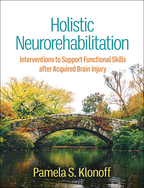Holistic Neurorehabilitation
Interventions to Support Functional Skills after Acquired Brain Injury
Pamela S. Klonoff
“Klonoff has devoted her career to the provision of holistic neurorehabilitation. Her depth of experience and wisdom shine a light for readers who want to emulate this model in their own clinical settings. The book presents the fundamentals of holistic milieu therapy and describes evidence-based and novel approaches to treating cognitive, social communication, and emotional consequences of acquired brain injuries. It discusses how to generalize treatment gains to home and community through work with families and reestablishing important living skills. Klonoff provides enough procedural details, handouts, and other resources for clinicians to confidently implement the interventions in their own practices.”
—Jill Winegardner, PhD, Director of Neuropsychological Rehabilitation, University Hospitals Cleveland Medical Center
“Klonoff brings to life her collaborative, dynamic, humanistic approach to post-acute holistic rehabilitation for patients with acquired brain injury. The book captures the central relevance of the uniqueness of each patient, the role of the family, and the importance of maintaining a nurturing atmosphere across the multiple disciplines that make up the rehabilitation team. User-friendly clinical vignettes, checklists, rating scales, and handouts are incorporated throughout. The comprehensive, hands-on orientation of this volume maximizes its value and applicability across health systems, settings, and disciplines.”
—Jacinta Douglas, PhD, Emeritus Professor, Living with Disability Research Centre, La Trobe University, Australia
“Klonoff and her colleagues have given the contemporary field of neurorehabilitation a strikingly unique gift. This book arms the provider with theoretically and empirically grounded rehabilitation strategies, abundant reproducible forms, and case examples that illustrate the principles and protocols. Klonoff also shares time-tested guidance on how to develop and manage different types of neurorehabilitation programs to ensure program success. I felt as if I was learning something new and important on every page. This fantastic book is a 'must read' for graduate and postgraduate students who want a truly hands-on guide. Any neurorehabilitation provider who reads this book will get a treasure chest of tools to improve their programs, services, and outcomes.”
—Lance E. Trexler, PhD, HSPP, FACRM, Department of Physical Medicine and Rehabilitation, Indiana University School of Medicine
Table of Contents
I. Introduction to Neurorehabilitation1. The Evolution of Fundamental Concepts of Post-Acute Neurorehabilitation: Historical and Current Considerations
2. How to Construct Quality Neurorehabilitation in the Hospital and Community Settings, with Christopher St. Clair, Robert Spetzler, & Thomas Bour
II. Clinical Approaches and Techniques
3. Techniques to Address Cognitive Skills, with Heather Caples
4. Techniques to Address Communication Pragmatic Skills and Emotions, with Erika Ehlert & Padmaja Bollam
5. Treatment Groups for Functional Skills, with Jennifer Hunsaker, Patricia Briody, & Erika Ehlert 
6. Technological Advances in Post-Acute Neurorehabilitation, with Maura Eileen Rhodes & Samuel Schaffer
III. Transfer of Skills
7. Transfer of Skills to the Home, Community, and Work, with Heather Caples, Lori Lindman, Maura Eileen Rhodes, Jennifer Hunsaker, & Erika Ehlert
8. Post-Acute Neurorehabilitation for Socialization, Quality of Life, and School Re-Entry, with Alicia Blank, Meghan Grange, & Amy Helmuth
9. Holistic Interventions for Families and Tiers of Support and Aftercare, with Edward Koberstein & Sarah Rajda
References
Index
About the Author
Pamela S. Klonoff, PhD, ABPP-CN, has been a faculty neuropsychologist at the Center for Transitional Neuro-Rehabilitation at Barrow Neurological Institute, Dignity Health, Phoenix, Arizona, since 1986, and became the Center’s Clinical Director in 1993. Her passion and primary clinical endeavors are in holistic milieu neurorehabilitation, with an emphasis on psychotherapy for patients and families, group interventions, cognitive retraining, and mentoring therapists. Dr. Klonoff has published and presented widely in the areas of acquired brain injuries, holistic milieu-oriented treatment, individual and group psychotherapy, family interventions, and cognitive retraining so as to maximize patients’ community reintegration.Contributors
Alicia Blank, MS, CCC-SLP, Center for Transitional Neuro-Rehabilitation, Phoenix, AZPadmaja Bollam, MD, Center for Transitional Neuro-Rehabilitation, Phoenix, AZ
Thomas Bour, MHA, Barrow Neurological Institute, Phoenix, AZ
Patricia Briody, PT, DPT, Center for Transitional Neuro-Rehabilitation, Phoenix, AZ
Heather Caples, PhD, Center for Transitional Neuro-Rehabilitation, Phoenix, AZ
Erika E. Ehlert, MS, CCC-SLP, Center for Transitional Neuro-Rehabilitation, Phoenix, AZ
Meghan Grange, MS, CCC-SLP
Amy Helmuth, BS, CTRS, Center for Transitional Neuro-Rehabilitation, Phoenix, AZ
Jennifer Joy Hunsaker, MS, CCC-SLP, Center for Transitional Neuro-Rehabilitation, Phoenix, AZ
Edward Koberstein, MSC, CC-MH, Center for Transitional Neuro-Rehabilitation, Phoenix, AZ
Rivian Lewin, MS
Lori Lindman, MS, OTR/L, Center for Transitional Neuro-Rehabilitation, Phoenix, AZ
Kavitha Perumparaichallai, PhD
Sarah Rajda, MOT, OTR/L, AOTA, CBIS, NBCOT, Center for Transitional Neuro-Rehabilitation, Phoenix, AZ
Maura Eileen Rhodes, MS, CCC-SLP, Center for Transitional Neuro-Rehabilitation, Phoenix, AZ
Susan Rumble, PsyD
Samuel Schaffer, PT, DPT, Center for Transitional Neuro-Rehabilitation, Phoenix, AZ
Robert Spetzler, MD, Barrow Neurological Institute, Phoenix, AZ
Christopher St. Clair, MOT, OTR/L, MBA, Barrow Neurological Institute, Phoenix, AZ
